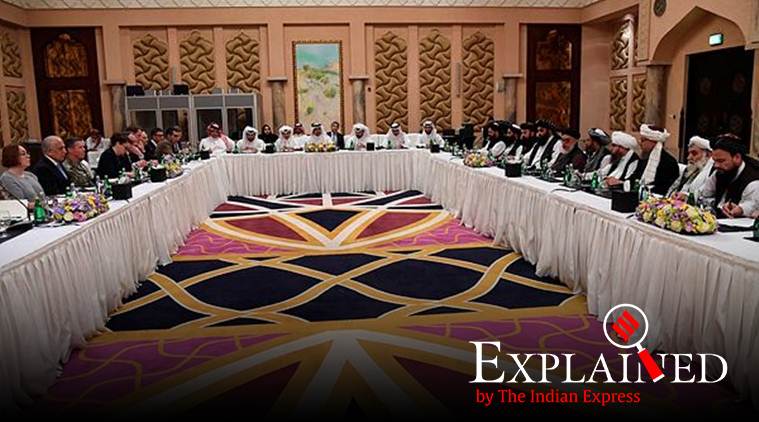Reported by Adrija Roychowdhury |Edited by Explained Desk |New Delhi |Published: March 4, 2019 5:31:52 pm
Explained: Taliban-US talks and the future of Afghanistan
The very fact that the US is talking to the Taliban legitimises their role in Afghanistan's present and future. All of this is worrying for India -- a Taliban government in Afghanistan in the near future will mean a hugely increased leverage for Pakistan in that country.

American diplomats and the Taliban resumed negotiations in Doha, Qatar, on Saturday after a two-day break. The two parties have held several rounds of talks since last year in a bid to end the 17-year-long war in Afghanistan. The ongoing discussions began in the last week of February and was on a two-day recess, during which period a series of small meetings were held around town to bridge gaps on key issues in the negotiations.
President Donald Trump has directed US diplomats to hold direct talks with the Taliban. The stated objective is to narrow the gap between opposing positions and hold broader, more formal negotiations to end the war.
The Taliban have long maintained that they would negotiate only with the US, which toppled their regime in 2001. However, the US has insisted that the Afghan government should be involved in the process. Several attempts at holding discussions to end the war have, therefore, not progressed. Trump’s decision to hold direct negotiations was, therefore, a significant policy shift.
US special representative Zalmay Khalilzad has met with Taliban deputy leader Mullah Abdul Ghani Baradar, a co-founder of the Islamist movement who is believed to be close to the Taliban emir, Maulvi Haibatullah Akhundzada. Khalilzad and Baradar are reported to have agreed in principle on a framework for a deal last month.
Under the framework agreement, the United States is required to withdraw all its troops from Afghanistan, and the Taliban are required to never use Afghan soil for carrying out terrorist activities. After the last set of discussions in January, Khalilzad had said in an interview to The New York Times: “The Taliban have committed, to our satisfaction, to do what is necessary that would prevent Afghanistan from ever becoming a platform for international terrorist groups or individuals.”
More recently, the Taliban negotiating team has claimed the discussions were progressing, and that the technical groups were working a draft agreement. However, several complications continue to stand in the way, including the continued violence in Afghanistan. Last week, Taliban fighters had attempted to storm a US-Afghan military base in the southern Afghanistan province of Helmand.







































No hay comentarios:
Publicar un comentario